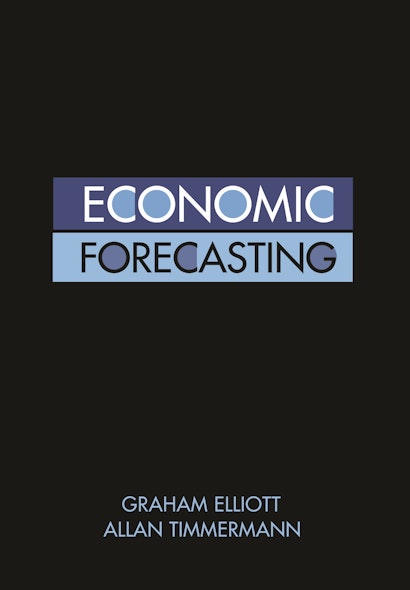Economic forecasting involves choosing simple yet robust models to best approximate highly complex and evolving data-generating processes. This poses unique challenges for researchers in a host of practical forecasting situations, from forecasting budget deficits and assessing financial risk to predicting inflation and stock market returns. Economic Forecasting presents a comprehensive, unified approach to assessing the costs and benefits of different methods currently available to forecasters.
This text approaches forecasting problems from the perspective of decision theory and estimation, and demonstrates the profound implications of this approach for how we understand variable selection, estimation, and combination methods for forecasting models, and how we evaluate the resulting forecasts. Both Bayesian and non-Bayesian methods are covered in depth, as are a range of cutting-edge techniques for producing point, interval, and density forecasts. The book features detailed presentations and empirical examples of a range of forecasting methods and shows how to generate forecasts in the presence of large-dimensional sets of predictor variables. The authors pay special attention to how estimation error, model uncertainty, and model instability affect forecasting performance.
- Presents a comprehensive and integrated approach to assessing the strengths and weaknesses of different forecasting methods
- Approaches forecasting from a decision theoretic and estimation perspective
- Covers Bayesian modeling, including methods for generating density forecasts
- Discusses model selection methods as well as forecast combinations
- Covers a large range of nonlinear prediction models, including regime switching models, threshold autoregressions, and models with time-varying volatility
- Features numerous empirical examples
- Examines the latest advances in forecast evaluation
- Essential for practitioners and students alike
Graham Elliott is professor of economics at the University of California, San Diego. Allan Timmermann holds the Atkinson/Epstein Chair at the Rady School of Management at the University of California, San Diego, where he is also professor of finance and economics.
"This book is an excellent and valuable one on economic forecasting for academics as well as practitioners. Specifically, the decision-theoretical approach employed by the book successfully conveys a new insight into the forecasting literature by making a clear connection between forecasting and decision-making. In addition, the book’s comprehensive arguments with numerous examples have no equal in other forecasting books."—Tatsuyoshi Okimoto, Economic Record
"Economic Forecasting provides a thorough analysis of the statistical theory underlying predictive models, covering a variety of alternative forecasting methods in both classical and Bayesian contexts, as well as techniques for forecast evaluation, comparison, and combination. The methods are illustrated with numerous examples from economics and finance."—Massimiliano Marcellino, Bocconi University
"Elliott and Timmermann should be congratulated on producing a text that places forecasting at the heart of decision making in economics. There are many good texts on forecasting, but none provides a comprehensive integration of forecasting and forecast evaluation with decision making as it is done in this volume. In addition, the book covers standard forecasting techniques as well as recent developments dealing with model instability, real-time and mixed-frequency data, and forecast combination. The book is highly recommended."—Hashem Pesaran, director of the USC Dornsife Institute for New Economic Thinking and John Elliott Distinguished Chair in Economics, University of Southern California
"This fine book is timely and unique. The early and continuous emphasis on the loss function is wonderful, as is the insightful treatment of forecast combination. Economic Forecasting is a book that needed to be written."—Francis X. Diebold, University of Pennsylvania
"This book provides an up-to-date guide to forecasting for applied researchers. Particular care is devoted to reviewing theoretical results and providing detailed theoretical and empirical examples. The book also includes guidance on which methods to choose."—Barbara Rossi, ICREA-Pompeu Fabra University, Barcelona
"Economic Forecasting is a great book by two leaders in the field. Elliott and Timmermann present a complete and modern view of forecasting methods in economics, covering both traditional topics and the latest research in this area. It deserves a spot on every economist's bookshelf."—Andrew J. Patton, Duke University



